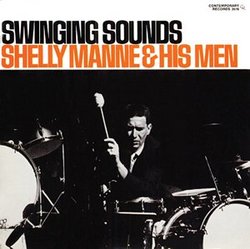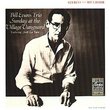| All Artists: Shelly Manne, Stu Williamson, Charlie Mariano, Leroy Vinnegar Title: Swinging Sounds Members Wishing: 2 Total Copies: 0 Label: Jvc Japan Release Date: 9/22/2005 Album Type: Import Genres: Jazz, Pop Styles: Cool Jazz, Bebop Number of Discs: 1 SwapaCD Credits: 1 Other Editions: Swinging Sounds 4 UPCs: 4988002489718, 090204539826 |
Search - Shelly Manne, Stu Williamson, Charlie Mariano :: Swinging Sounds
CD DetailsSimilar CDs
|
CD ReviewsThe #1, Perfect Small Group Jazz Album P. Simms | Williamsburg, VA | 04/22/2006 (5 out of 5 stars) "An album's quality is no guarantee that it will be classiied as "One of the most important of the genre!", any more than being important equates to finest quality. Also, being important can mean just to jazz, overall, historically, or to me, personally, when a budding young musician. I'd always listended to my family's Swing Era big-band records. Opera was the only other choice. By eighth grade, I was playing in both the school band, and a historical music group. Our mentor was always going on about Shelly Manne, but none of us had heard him. One day a friend found this album in the town's only record store, and I was hooked. This album changed my life and my outlook on music.
Suddenly I was hearing bold, jagged new concepts in harmony, phrasing, rythm, new unheard of chord progressions, and above all, the very finest improvisation. It felt to me, then, as I envision today, what it would have been like for Mozart and Beethoven to suddenly get to hear Shoenberg, Prokofiev or Stravinski. I knew then that I wanted to be a professional musician. Soon after, I realized I could hear the melody of "Cherokee" in my head, while listening to our mentor's Kenton version, where the melody is never played. I knew then that I had the ability, too. This is a perfect album because no expense is spared to make it so. All five musicians were expeienced, performing and in the studio, and all were tops on their axes. The tunes are all uniique and infintiely challenging to the ear. Rather than just play the melody and go into the solos, these tunes are artfully arranged with surprising and delightful turns in each road they take. The takes are clean, but not remotely sterile as each one just cooks. The solos are flawless...nothing hesitant...no clunkers heard and no noodling, on the off chance of hitting a good lick. The solos are so perfect and consistant that it sounds almsot too good not to be rehearsed. In fact, in the eighth grade, when I heard it the first time, Goodman had just come off of the turntable, and I couldn't believe these guys were improvising. If Gooman and Harry James had been improvising, then they were just mere mortals, while Shelly's men were gods. Russ Freeman, Charlie Mariano or Stu Williamson may not be household names to some jazz listeners, but they were the top studio players for decades, and are well know to other musicians. They can be heard on innumerable albums, especially jazzy sound tracks from movies and T.V. Stu is playing trumpet and gets a solo, along side Bud Shank, on Lalo Schifrin's great Mission Impossible album. Above all, they just play so well together, making it a virtually perfect matching of musicians. It's close to impossible to select any one or two solos by anyone that stands out above their other solos, as they are all so good. The exceptions for me is Stu Williamson's solo on Bud Powel's "Un Poc Loco". It's almost as if it was arranged just to feature him, alone. His part starts out slow but swinging, and suddenly soars into the most beautiful melodies, and then really takes off when it goes back into quick time. The perfection of his melodic lines are uncharacteristic for many trumpet players, who sometimes seem to crack or miss a note, blow a clunker, get lost, and go on a high speed noodle, hoping to find a way out. His melodic lines are usually only matched by guys on other instruments, like sax, flute and piano. I've played Stu's solos for other trumpet players and they usually claim to have never heard anyone play so beautifully. I played woodwinds since 7th grade, and started out as a percussion major in college. But listening to myself on tapes of live performances, years later, I was amazed at how much my sax and flute solos had borrowed licks and phrasing from a trumpet player, this trumpet player. For most of the guys who've heard this recording by "The drummer's drummer," Shelly's solo on "Un Poco Loco" is most often considered his best, if not as good as anybody's best. Reviews by jazz critics, then and with subsequent re-releases, say the same thing. It's like nothing you've ever heard, though you could argue that his work on the Jack Montrose Sextet album, also a perfect one, is his best. It was eigth grade and I heard the second side first. Jack Montrose's wild arrangement of the classic, "Bernie's Tune", went through my ears like a bullet, and has been stuck in my head and never left since then. Riding down the highway, my brain never stops improvising, as often as not, on "Bernie's Tune". During college, I was asked to fill-in, briefly, at a club date, on drums, for my mentor and drum teacher. I took my flute and baritone, in hopes of being asked to sit in, when he returned. He just asked, "What do you want to play?" We ripped out Bernie's tune, and of course, I had to throw in every Stu Williamson phrasing and lick I could remember. The funny part is that he'd never heard me play flute, and was surprisingly impressed. I've heard many albums since this one, and it still is about the very best I have heard. That it was the first of it's kind, for me, is irrelivent. It was just a most fortuitous coincidence. Thanks, Shelly & your men for opnenining my mind to musical sounds. And thanks, Stu, for teaching me to wail." |



